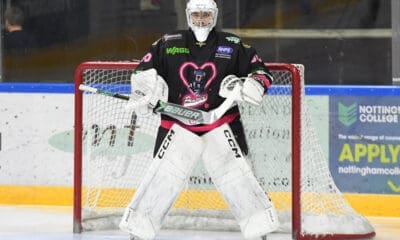The Manchester Storm announced on Saturday [11 May] that head coach Matt Ginn departed the club to pursue an opportunity in North America.
Ginn’s stint with the Storm spanned five seasons, three as the team’s starting netminder before spending two years behind the bench, and saw him become a fan favourite in Manchester.
The Storm finished sixth in the Elite League in his first season as bench boss, laying the groundwork for a stunning fourth-placed finish a year later.
Manchester’s form saw Ginn named Elite League Coach of the Year for 2023-24 and attract interest from a number of North American suitors.
“I am truly grateful for my time in Manchester and the opportunity that I was given from Ryan and Emma [Finnerty],” said the departing Ginn.
“It was an incredibly difficult decision to move on, but one that we felt was best for our family right now. I’d like to thank the fans for their support, Mike Morin and the staff for all of their hard work behind the scenes and of course the players. I loved going to the rink each day and that was because of the people and players that we were surrounded by.
“The organization is in a great place both on and off the ice and I am excited to watch the Storm continue to grow.”
Analysis: Manchester Storm will sorely miss head coach Matt Ginn
In the wake of an incredibly impressive fourth-place finish in the Elite League, the Manchester Storm have been left reeling by the departure of head coach Matt Ginn.
The former netminder stole the show in just his second year behind the bench, winning the Elite League Coach of the Year Award with a “budget-defying” 27-20-7 record.

Image: Matt Ginn, Manchester Storm (Image: All Sports Photography)
Manchester fell short in the playoffs, upset 9-1 in the quarter-finals by the Guildford Flames, and faced group stage elimination in the Challenge Cup, but more than proved their quality over the course of the Elite League’s 54-game regular-season.
When you dig into the numbers, Ginn’s impact jumps through the screen.
The Storm finished the year bottom of the team scoring charts and with zero players listed amongst the league’s top-25 point-producers. (Manchester’s powerplay was also the worst in the class.)
However, Ginn squeezed every drop of potential out of his roster by implementing smart defensive systems at even strength and on the penalty kill, which placed third in the league behind similarly well-coached teams from Sheffield and Coventry.
In other words, Ginn coached an offensively-limited squad to a top-four finish that nobody anticipated.
The Storm will miss him dearly.











